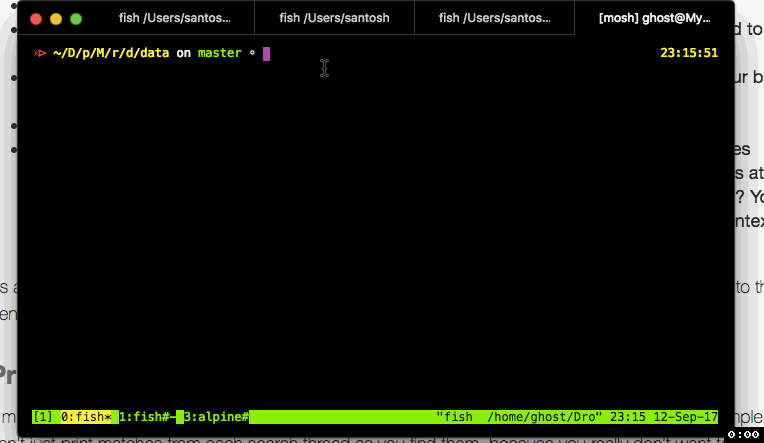

It can also handle 4Gb+ files because of this which binwalk cannot. We are using hyperscan 3 instead of grepping byte sequences with Python, which is orders of magnitudes faster. running it a second and subsequent times, fzf indexes a good bit faster. Hyperscan is an Intel regular expression library. ripgrep recursively searches directories for a regex pattern and outputs all matches that it finds.

Has the same lack of automatic git syncing. There does seem to be a 'caching' aspect to this. MaIn this post, I want to introduce you to ripgrep, a smart and fast command line search tool that I find myself using all the time when programming. notational-fzf-vim is similar to shell-velocity and also looks pretty good, but is now unmaintained and I do not have the knowledge to maintain it myself should something break.

Now I don't know how my factor of 5 changed to a factor of barely 2. Grain of salt with these times, probably not accurate to more than ~0.25 sec, i did not use a stopwatch. (2) but cached to diskįrom doing the same thing inside my ubuntu 14.04 vm on same machine: vim/plugged/fzf/bin/fzf '-ansi' '-prompt' 'Rg> ' '-multi' '-bind' 'alt-a:select-all,alt-d:deselect-all' '-color' 'hl:68,hl+:110' -reverse -prompt "FLines> " -expect=ctrl-v,ctrl-s,ctrl-t -height=29 In case you havent heard of it before, ripgrep is a line-oriented search. There is also a fix for a security vulnerability on Windows. bug fixes, some performance improvements and a few minor breaking changes. This guide assumes that ripgrep is installed and that readers have passing familiarity with using command line tools. I want to use rga-fzf which is a function for zsh/bash using fzf together with ripgrep-all. Warning: when using FZF, please fasten your seatbelt, because it can get REALLY fast. ripgrep 13 is a new major version release of ripgrep that primarily contains. This guide is intended to give an elementary description of ripgrep and an overview of its capabilities.
#Fzf vs ripgrep pro
rg, ag two replacements for grep, search. Search for files like a pro with fzf, command line fuzzy finder. vim/plugged/fzf/bin/fzf '-ansi' '-prompt' 'Rg> ' '-multi' '-bind' 'alt-a:select-all,alt-d:deselect-all' '-color' 'hl:68,hl+:110' -reverse -prompt "FLines> " -expect=ctrl-v,ctrl-s,ctrl-t -height=29Ĭat. 4 I am trying to convert this bash/zsh function into fish. These are various external commands which can be used from vim/nvim (and none of them are necessary for using it): fzf - very weird command which helps with dealing with very long results of some other commands (useful even outside of nvim). Rg -color=always -no-heading -hidden -v '^$' |. Rg -color=never -no-heading -hidden -v '^$' |. It should have looked something like this: The problem here is that each line of example.md is a item, it should be one item containing each file. Useful-example.md:something something foo somethingĮxample.md:something something foo something | fzf in the directory containing them, write foo, and get following results: Something something foo something useful-example.md bat, exa, and ripgrep are modern replacements for cat, ls, and grep respectively. I am currently using ripgrep and fzf to do this, the problem is that each line of each file becomes a search item, i need each item to contain all lines of its file. fzf is a general-purpose command-line fuzzy finder. I need to fuzzy search a directory of textfiles, where the contents of the files is searched too.


 0 kommentar(er)
0 kommentar(er)
